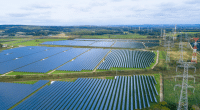The Guinean Ministry of Energy, Hydraulics and Hydrocarbons is launching a call for expressions of interest to carry out the environmental and social impact study (ESIA) and the Resettlement Action Plan (RAP) of the "reinforcement of the drinking water production capacity for the city of Conakry" component of the Guinea Urban Water Project (PUEG). Interested consulting firms have until 12 October 2022 to apply.
Knowing that any project introduces changes in its environment, the government of the Republic of Guinea wants to be sure about the Urban Drinking Water Project (PUEG) before it starts. Therefore, the government of this West African country is looking for a consulting firm to carry out the Environmental and Social Impact Assessment (ESIA) and the Resettlement Action Plan (RAP) of this project. The studies concern its component “reinforcement of the drinking water production capacity for the city of Conakry”.
Interested firms have until 12 October 2022 to apply. After the study has been completed, the selected firm will have to establish appropriate measures to improve, mitigate and/or compensate for the environmental and social impacts likely to occur during the project and during the operation of the drinking water production facilities, in accordance with the environmental regulations in Guinea and in compliance with the World Bank’s operational policies on environmental and social safeguards triggered by the PUEG.
Drinking water for 730,000 people in Conakry
The RAP will have to provide strategies to ensure that the people affected by the drinking water project are consulted effectively “in full freedom and with the greatest transparency”. The affected populations will also need to be informed of the technical and economic alternatives (travel allowance). They will also need a transitional period based on a reasonable estimate of the time likely to be needed to restore their livelihoods and incomes…
At the various sites, it is planned to develop the water intake structures, replace the raw water transport pipe (9 km) at the Kitema catchment point and renew the section of the grey cast iron treated water pipe between PK43 and Dabompa Forêt. The drinking water component of the PUEG project also includes the laying of 18 km of distribution pipes to eliminate pirate networks, as well as the rehabilitation of 8 km of obsolete pipes in the councils of Matam and Kaloum in Conakry.
Read also –
At least 5,000 new connections will be made, as well as 20 standpipes to serve 730,000 people in Conakry and some surrounding towns, notably Coyah, Dubreka, and Forécariah. The World Bank, through its subsidiary IDA (International Development Association), is financing the work to the tune of 30 million dollars.
Launched in 2020 for a period of five years, the project will also enable the establishment of a master plan for Greater Conakry to improve the management of rainwater, wastewater and sewage sludge, as well as the strengthening of the operational capacities of the Guinea Water Company (SEG).
For more information on the tender, click here.
Inès Magoum







